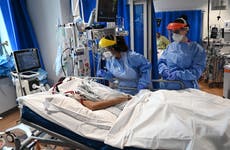Oxford volunteer ‘proud and pleased trial was not a waste of time’ after results published
Jab is not yet as effective as ones made by Pfizer and Moderna
Your support helps us to tell the story
From reproductive rights to climate change to Big Tech, The Independent is on the ground when the story is developing. Whether it's investigating the financials of Elon Musk's pro-Trump PAC or producing our latest documentary, 'The A Word', which shines a light on the American women fighting for reproductive rights, we know how important it is to parse out the facts from the messaging.
At such a critical moment in US history, we need reporters on the ground. Your donation allows us to keep sending journalists to speak to both sides of the story.
The Independent is trusted by Americans across the entire political spectrum. And unlike many other quality news outlets, we choose not to lock Americans out of our reporting and analysis with paywalls. We believe quality journalism should be available to everyone, paid for by those who can afford it.
Your support makes all the difference.A volunteer who took part in the Oxford University coronavirus vaccine trial has said he is “proud and pleased” after hearing news of the jab’s 90-per-cent effectiveness.
Dan McAteer, a postgraduate student at Oxford University itself, admitted he was glad his part in the research had not been for nothing.
“In truth, the vaccine news has come so thick and fast - with Pfizer and Moderna announcing first - that the results this morning were a bit surreal,” Mr McAteer told The Independent this afternoon.
“But I’m definitely feeling proud and pleased that it wasn’t all a waste of time,” he said, before adding: “And that the vaccine is cheap enough to be truly global - not just for the West.”
Another trial volunteer, journalist Sarah Hurst, said it was a “great feeling” to be involved in the development process of the UK’s vaccine.
She told the PA news agency: “It’s really the developers and everyone who’s done all the work, all the medical students who are constantly all day meeting the vaccine participants and testing them and being on the front line.”
“It's good, it's a great feeling to help to make a vaccine,” she added.
Mr McAteer and Ms Hurst both received two jabs of either the experimental vaccine or a placebo as part of the research.
Follow live: Johnson announces new tiers in place until spring.
The vaccine group’s director, Professor Andrew Pollard, said there had been no hospitalisations or severe cases in anyone who had the Oxford vaccine in the trial.
“We are really pleased with these results,” Prof Pollard told BBC Radio 4’s Today programme. He also said that the trial’s positive results indicated that if people were to be vaccinated using the Oxford jab, “we would be able to stop people getting severe disease and going into hospital”.
Ms Hurst, making reference to the Pfizer vaccine which scientists revealed last week needs to be chilled at -70C, described the results as “promising”; she said “the fact it doesn't need to be chilled at a very low temperature and is cheaper than the other vaccines will help in making it easier to distribute”.
Mr McAteer agreed, he said he hoped the Oxford vaccine’s cost and stability means it “will be the work horse for our journey back to normality”. The academic stressed how glad he was to have “taken part in something geared towards public good and not private profit”.
“£3 a dose vs more than £20 for the others is a vast difference,” he added.
Another trial volunteer, Jack Sommers, said it was hard to believe how quickly scientists had developed the vaccine.
“I can't help but take my hat off to the scientists,” Mr Sommers said.
“I remember six months ago sitting in a hospital watching a safety video, with Professor Matthew Snape at Oxford University talking in quite careful, deliberate, cautious terms about how this vaccine might work or it might not work.”
He praised the trial’s scientists, saying the results were “testament to the work of so many people, so many extraordinary people”.
During the trial, Mr McAteer and Mr Sommers both experienced mild side effects - shivers and slightly raised temperatures - while Ms Hurst felt none at all.
Mr Sommers admitted that, although he was pleased to read about positive results from other vaccines, he was vying for the Oxford vaccine to be a success. “It does feel a bit like I was supporting a team and it was good to watch other teams win and score, but now my team has won and I'm very happy about that,” he said today.
While Mr McAteer said he was just pleased “solutions” to the pandemic were coming from a British university. “Without being over-the-top, the fact that a British university is at the centre of solutions to this global nightmare is something to be proud of,” he told The Independent.
The UK has placed orders for 100 million doses of the Oxford vaccine – enough to vaccinate most of the population – with Matt Hancock telling the BBC today that the government hoped vaccination would be able to begin next month.



Join our commenting forum
Join thought-provoking conversations, follow other Independent readers and see their replies
Comments